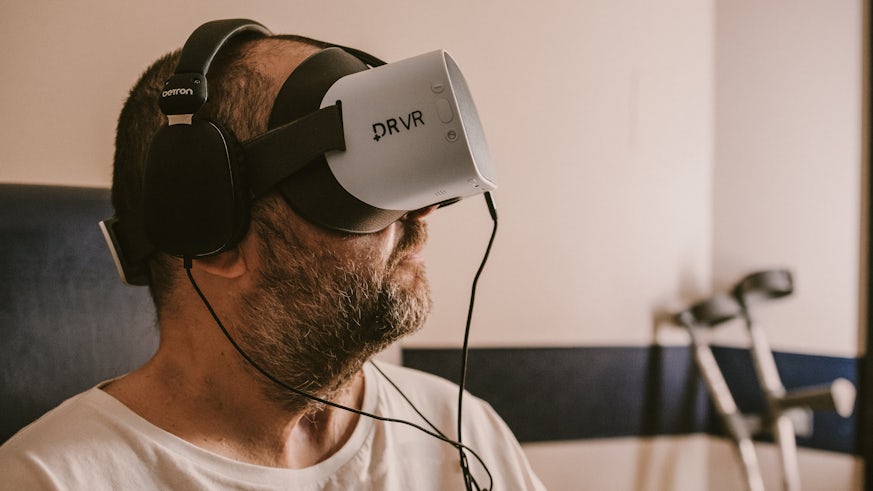NHS staff tackling COVID-19 try out virtual reality to help reduce stress and anxiety
11 June 2020

NHS staff tackling Covid-19 on the front line are, for the first time, using virtual reality to help support their mental health and wellbeing.
Twenty-one staff working in intensive care units at the Royal Glamorgan and Prince Charles hospitals had access to a single-use VR headset for two weeks to evaluate if it was a useful aid to help with stress and anxiety.
Researchers from Cardiff University’s Centre for Trials Research (CTR), who worked with Cwm Taf Morgannwg University Health Board and Rescape Innovation, which uses VR to support patient recovery and rehabilitation, said the response had been positive - but a wider scale study was needed.
Lead author Dr Kim Smallman, Research Design and Conduct Service Consultant and Research Associate at the CTR, said: “The impact on the mental health and wellbeing of frontline healthcare workers - and the need to provide emotional support for those working in such exceptional and distressing circumstances - became clear very early on in the pandemic.
"We decided to evaluate use of virtual reality to see if this could be a useful aid for staff and the results have been remarkably positive. Staff using VR said they found the experience to be enjoyable and relaxing and they found it helpful in reducing feelings of stress and anxiety.

We now hope to trial this on a much larger scale and we think it has real potential to help many more people - and to further our understanding of how VR can be used in the management of stress and anxiety.
Participants selected their global virtual reality of choice, such as a tour of Welsh landscapes culminating in the Principality Stadium and the anthem before the Wales v England match to a guided journey through a rainforest, a voyage under the sea or a wildlife safari. Participants had a choice of five immersive experiences and three meditative spaces with guided breathing exercises.
In the evaluation staff said they found using VR an enjoyable experience and they would recommend use to their colleagues to aid relaxation and for reducing stress. In particular, staff valued the meditative spaces and breathing exercises.
Emily James, 29, an ITU nurse at the Royal Glamorgan Hospital, said: “I work in ITU and the past few months have been busy and emotionally difficult for us all. I began using the VR headset at home after busy shifts and I found the meditation and breathing programmes very calming.
“The VR technology has the potential to really help those working in healthcare, particularly if it could be used at break times and mid shift.”
Evaluation co-author Dr Michelle Smalley, a clinical psychologist working in intensive care at the Royal Glamorgan and Prince Charles hospitals, said: “Being a clinical psychologist in unprecedented times has called for unprecedented measures to help support staff.
“From the moment I tried these headsets out myself, I realised their potential for helping with anxiety and stress - but we have to be evidence based in our approach. The results from this service evaluation are an important step in identifying an effective and user-friendly self-help tool for wellbeing. I'm excited to see the results from a wider scale implementation.
"The evaluation has been made available today on the new FutureVision.Health web platform, a portal set up to promote the benefits of immersive technologies in healthcare.
Rescape Innovation CEO Matt Wordley said: “We’re now looking for research funding to investigate how VR can be used to support mental health and wellbeing and we would like to test, at scale across the UK, its effectiveness for helping to manage stress and anxiety currently being experienced by many frontline workers.”
The CTR is funded by Welsh Government through Health and Care Research Wales and Cancer Research UK.
Share this story
The School is a major international centre for teaching and research, and committed to the pursuit of improved human health.




